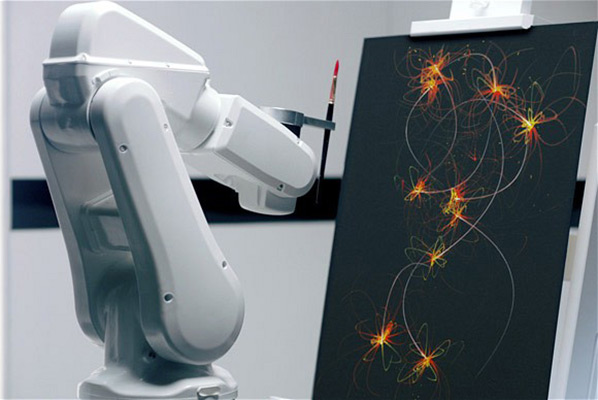function setup() {
createCanvas(600, 600);
background(230);
text("p5.js vers 0.9.0 test.", 10, 15);
}
function draw() {
//hair
background(252, 225, 152);
fill(56, 39, 35);
rect(140, 60, 320, 540, 130, 130, 70, 70);
//head
fill(240, 208, 180);
noStroke();
rect(175, 100, 250, 300, 100, 180, 100, 100);
rect(265, 370, 70, 120, 30);
rect(170, 461, 260, 96, 30);
ellipse(431, 300, 24, 47);
noFill();
//eyebrows
stroke(74, 50, 34);
strokeWeight(8);
line(290, 200, 340, 200);
line(180, 200, 225, 200);
noStroke();
//nose
stroke(236, 193, 156);
strokeWeight(3);
noFill();
beginShape();
curveVertex(240, 268);
curveVertex(240, 268);
curveVertex(231, 280);
curveVertex(229, 293);
curveVertex(235, 301);
curveVertex(235, 301);
endShape();
noStroke();
//moles
fill(74, 20, 0);
ellipse(307, 362, 2, 2);
ellipse(347, 278, 5, 5);
ellipse(212, 286, 3, 3);
//eyes
fill(255);
noStroke();
ellipse(310, 236, 36, 21);
ellipse(204, 236, 36, 21);
stroke(0);
strokeWeight(4);
noFill();
beginShape();
curveVertex(292, 231);
curveVertex(292, 231);
curveVertex(309, 223);
curveVertex(328, 230);
curveVertex(340, 233);
curveVertex(351, 226);
curveVertex(351, 226);
endShape();
beginShape();
curveVertex(223, 231);
curveVertex(223, 231);
curveVertex(208, 223);
curveVertex(188, 230);
curveVertex(188, 230);
endShape();
fill(0);
ellipse(310, 235, 18, 18);
ellipse(206, 235, 18, 18);
noStroke();
//shirt
fill(240, 208, 180);
noStroke();
rect(415, 529, 55, 200);
rect(130, 529, 55, 200);
fill(255);
noStroke();
beginShape();
curveVertex(413, 550);
curveVertex(413, 550);
curveVertex(416, 517);
curveVertex(421, 494);
curveVertex(427, 476);
curveVertex(441, 477);
curveVertex(456, 487);
curveVertex(467, 500);
curveVertex(474, 516);
curveVertex(475, 530);
curveVertex(464, 537);
curveVertex(451, 545);
curveVertex(432, 552);
curveVertex(432, 552);
endShape();
beginShape();
curveVertex(185, 550);
curveVertex(185, 550);
curveVertex(182, 516);
curveVertex(178, 493);
curveVertex(172, 476);
curveVertex(157, 477);
curveVertex(140, 487);
curveVertex(132, 500);
curveVertex(125, 516);
curveVertex(124, 529);
curveVertex(135, 537);
curveVertex(148, 545);
curveVertex(167, 551);
curveVertex(167, 551);
endShape();
rect(180, 550, 240, 100);
//hair 2
stroke(232, 222, 218);
strokeWeight(30);
line(189, 155, 189, 570);
line(372, 130, 372, 570);
noFill();
beginShape();
curveVertex(295, 104);
curveVertex(295, 104);
curveVertex(336, 103);
curveVertex(364, 114);
curveVertex(374, 142);
curveVertex(374, 142);
endShape();
beginShape();
curveVertex(189, 159);
curveVertex(189, 159);
curveVertex(196, 133);
curveVertex(222, 112);
curveVertex(248, 107);
curveVertex(270, 106);
curveVertex(270, 106);
endShape();
noStroke();
fill(56, 39, 35);
rect(386, 100, 39, 485, 60);
//earring
noFill();
stroke(233, 233, 233);
strokeWeight(4);
ellipse(431, 377, 61, 123);
noStroke();
//mouth
noStroke();
fill(240, 190, 180);
beginShape();
curveVertex(217, 335);
curveVertex(217, 335);
curveVertex(221, 328);
curveVertex(228, 324);
curveVertex(235, 323);
curveVertex(243, 324);
curveVertex(250, 326);
curveVertex(255, 330);
curveVertex(258, 335);
curveVertex(253, 340);
curveVertex(245, 341);
curveVertex(238, 342);
curveVertex(230, 341);
curveVertex(224, 339);
curveVertex(224, 339);
endShape();
stroke(212, 113, 139);
strokeWeight(3);
line(220, 333, 255, 333);
noStroke();
}
Author: anaarg
LO- My Inspiration
The Sleep Art Project
By ACNE production and BETC Paris for Ibis Hotels.
This project uses a robot’s 80 sensors to detect a person’s temperature, movements, and sounds while they sleep. This data is then translated into having the robotic arm paint different types of brush strokes and colors.The result is a unique painting created from a person’s sleep pattern.
This project took a team of 100 people to complete it in six months, and uses 50,000 lines of code to run.
This form of art experiments with the translation of a series of motions and conditions into a traditional art form; painting. The artists must have been inspired by the rise of artificial intelligence and the notion of how even our unconscious states can show creativity by using code to take the input (data from sleep) and output a painting.
I find this project inspiring because it translates more abstracted phenomena like temperature into distinct paint strokes and colors. It uses the unconscious human experience to create abstract art through computation. The project points to the future of artificial intelligence and using quantitative data in creative practices. The project can be applicable based on the simple idea of input and output. For example, translating a person’s walking pattern into a sculpture, etc. Overall, this interactive art project explores the collection of data and the execution of a painting in a way that is inspiring for future projects that follow a similar method of programming. Additionally, the programming of a robotic arm to do tasks such as painting invents a new tool for artists to create through a computer controlled arm that reflects a human hand.

![[OLD FALL 2020] 15-104 • Introduction to Computing for Creative Practice](../../../../wp-content/uploads/2021/09/stop-banner.png)